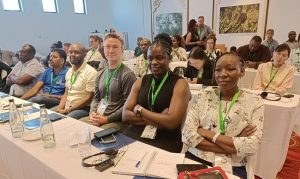With the current population growth in Africa, the attainment of food security and nutrition for the general populace is paramount, and seed is one of the most crucial determining elements. Arguably, sustainable and reliable production as well as access to quality and affordable seed is desirable to promote agricultural production and productivity for the required food and nutritional security.

This has been the pursuit of the African Seed Trade Association (AFSTA), since its formation in 2000 as the apex seed organisation, promoting the general development of the African seed sector through its annual congresses and seed fairs.
AFSTA 24th Annual Congress that held from March 5 to 6, 2024, in Mombasa, Kenya, was a show piece for the African seed sector, which attracted 300 delegates representing seed traders and producers from various regions of the world.
The guest of honour for the occasion, Kenya’s Cabinet Secretary Ministry of Agriculture and Livestock Development, Franklin Linturi Mithika, commended AFSTA “for continuously organising the seed fairs that have created opportunities for seed men and women to strengthen their seed businesses.”
Mr. Linturi noted that, through the Congress and AFSTA’s work, farmers had gained access to innovative technologies that have enhanced productivity and ultimately bolstered food and nutrition security. He also praised AFSTA for its role towards the establishment of the Regional Harmonised Seed Regulations in the continent.
The immediate past President of AFSTA, Dr Kulani Machaba, urged Africa’s seed sector to position itself to exploit the $4.18 billion project worth of the sector by 2030. He reminded the delegates that the sector was currently growing at an annual rate of Compound Annual Growth Rate (CAGR) of 5% (2024). Dr. Machaba stressed the need to grow the number of farmers who have access to certified seed, and reminisced that, currently, only 23% of smallholder farmers in the Common Market for Eastern and Southern Africa (COMESA) have access to improved varieties.
He observed that some challenges still persisted such as low investment in research and development targeting new varieties; long variety registration periods and weak funding of public research institutes, distinctiveness, uniformity and stability testing stations.
“These,” he said, “needed to be overcome through joint efforts.”
In his welcome address, AFSTA’s Secretary General, Justin Rakotoarisaona, emphasised the significance of the event happening amidst widespread discussions about the potential of genome editing technology in enhancing food security in Africa.
“AFSTA is firm in its belief that the economic progress of African countries hinges on the establishment of a strong seed sector, and advocates for the use of modern technologies in agricultural processes to accomplish this objective,” he stated.
“For this reason,” Mr. Rakotoarisaona added, “AFSTA has made continuous efforts to improve the environment for the seed business through its three-year Strategic Plan with a view to meaningfully contribute to the transformation of agriculture into an attractive, modern and sustainable livelihood option for communities throughout the continent.”
A press release signed by AFSTA’s Communication Officer, Aghan Daniel, provided additional details of the opening session, including a commendation by the Chairman of the National Organising Committee (NOC), Wellingtone Wasik, of the milestones the Kenya seed sector has achieved in the regulatory space.
“The Kenyan seed sector celebrates the milestones achieved within the regulatory space. The anchor regulator has opened the space for responsible self-regulation among private sector players. Building efficiency around this noble step is critical as it creates the platform for connectivity in tracking quality and building sustainability as we work to ensure the farmer accesses to high quality seed.”
The release further indicated that, during the Congress, a change of baton took place at AFSTA’s Board level, where Amadou Sarr of the Senegalse Seed Association (UNIS) was elected the new President of AFSTA, with Clive Mugadza of the Tanzania Seed Trade Association (TASTA) as Vice President. Thus, Dr Kulani, now the past President, will continue serving on the Board for two more years.
The release said topics covered at the formal session of the Congress included: “Challenges and opportunities from the Seed Trade Associations,” by Resource Persons from five African based National Seed Trade Associations; “Trends and emerging seed technologies applied in addressing various constraints of agriculture in Africa.” by Dr. Canisius Kanangire, Director of African Agricultural Technology Transfer Foundation (AATF), Kenya; and “What needs to be improved to promote seed trade in Africa? Analysing technical and socioeconomic contexts hampering the adoption rates of high-quality seed by farmers,” by Dr. Solomon Assefa Gizaw, Director of Technology for African Agriculture Transformation (TAAT – IITA), Benin.
Representatives of several regional and international organisations participated at the Congress. They included: International Seed Federation (ISF), EUROSEEDS, Union for the Protection of New Plant Varieties (UPOV), the International Seed Testing Association (ISTA), the Africa Regional Intellectual Property Organisation (ARIPO), the African Property Intellectual Organisation (OAPI) and African Union (AU).
According to the release, the next AFSTA Congress will be held in Kigali, Rwanda, from March 3 to 5, 2025.
By Ama Kudom-Agyemang
